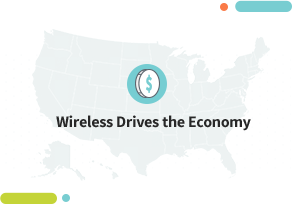An American Success Story
Scroll
A Series of Firsts
A Uniquely Competitive Industry
How Wireless Works
An Economic Driver
A Great Consumer Experience
Fueling American Innovation
A Series of Firsts.
From networks and handsets to apps and operating systems, America’s wireless industry is defined by innovation, ingenuity and enterprise.
America invented the cellphone, the smartphone and the app industry—and 4G networks were deployed here first. The U.S. was also the first country of its size to have three nationwide 5G networks. We lead the world in wireless, and that leadership brings significant benefits.
America’s competitive wireless industry drives our economy, powers innovation across industries, delivers the world’s very best mobile experience and helps creates safer communities. No industry is more central to our daily lives.
The Motorola DynaTAC 8000x, the first commercial handheld mobile phone, which offered 30 minutes of talk-time, approved by FCC.
The first smartphone, named the Simon Personal Communicator, was designed by IBM. It could send and receive emails, faxes, and pages.
The first 4G LTE networks were broadly deployed in the U.S.
The first 5G networks were deployed in the U.S.
A Great Consumer Experience.
Americans enjoy the best wireless experience in the world.
High-speed mobile broadband is available to nearly all consumers in the country, and those speeds keep going up. Wireless speeds are 117x faster than in 2010. Faster speeds mean better connections and more advanced apps.
estimated devices in America
of American adults own a cellphone
increase in wireless speeds since 2010
And we’re doing more on those networks. Wireless is increasingly the preferred way to access the internet. In 2022, wireless traffic topped 73.7 trillion MBs—the greatest increase in mobile data traffic ever and nearly double the year-over-year increase from 2020 to 2021.1
Wireless data use will continue to grow. By 2027, consumers will more than triple their mobile data use to 210 trillion MBs.2 It is indispensable to our everyday lives.
67%
view wireless as a must have in their community – more than good schools at 65%.
72%
would rather give up chocolate than give up their cell phone.
89%
can’t live without their smartphone.
How Wireless Works.
Companies across different industries work together to create the innovative wireless ecosystem.
Wireless providers deliver the signal that keeps you connected to family, friends, entertainment, jobs and a world of experiences and opportunities that make life better. Supporting this are network equipment manufacturers, handset companies, app developers and more. Learn more about how wireless works.
Share your life
Your wireless device can send video, voice, texts and email over thousands of miles in a fraction of a second. How does that process work?
An Economic Driver.
An impact felt across every state and every sector.
Wireless fuels our economy, supporting 4.5 million jobs and contributing $825 billion each year.3 That makes the U.S. wireless industry the 19th largest economy in the world.
Every wireless job creates an additional 7.7 jobs throughout the broader economy, making the industry’s contribution bigger than full-service restaurants and hardware manufacturing.4 Wireless jobs also pay over 40 percent more than the average American job.5
The impact is felt broadly across the country. To see the impact on your state, explore our interactive map.
Value Add by Industry
The wireless industry contributes more to the economy than other major industries like agriculture and publishing.
Arts, Entertainment, and Recreation
Agriculture
Education Services
Wireless Industry
We Invest in America.
Wireless companies make significant, long-term investments in America. In fact, wireless providers rank first and second in a list of companies making the largest annual domestic investment. Wireless investment has increased for the fifth year in a row, with a historic $39 billion invested in wireless networks in 2022—up nearly 12% from last year’s previously record-setting total. Over its history, the wireless industry has invested over $675 billion into its networks.6
in capital investments since 2018, the year the first 5G network launched
In addition to capital expenditures, the industry has also spent billions of dollars on spectrum licenses. Since 1993, wireless providers have invested over $233 billion in FCC spectrum auctions to power mobile networks.7
And we’re not stopping here. The industry continues to deploy and improve 5G wireless networks, which, according to Boston Consulting Group,8 are creating 4.5 million jobs and $1.5 trillion in economic growth.
5G-related Jobs
A Uniquely Competitive Industry.
Every day, America's wireless companies are doing everything we can to win your business.
We work relentlessly to improve our networks with faster speeds and innovative services such as unlimited data plans. And we spend billions each year to convince people to switch from their current provider or stay with the one they’re already using.
9 out of 10
Americans have 3 or more choices in mobile providers



That’s because consumers enjoy a variety of options. Nearly every American can choose between three or more providers and there are nearly 100 mobile providers, resellers, and MVNOs nationwide. Consumers can pick from hundreds of handsets, multiple operating systems, millions of apps and services and nearly 700 different smartphone plans.
All this competition adds up to lower prices and greater value. In fact, when recent once-in-a-generation inflation caused over 94% of goods and services to increase in price, wireless service and smartphones actually decreased in price. Prices have decreased over the long-term, too—unlimited data plans saw a more than 40% price decline since 2010.10
Cost per MB declined over the decade since 2010
99%
Since 2010, the price of unlimited data plans have decreased more than
40%
Fueling American Innovation.
For over forty years the wireless industry has pushed the boundaries of what’s possible – helping America become the most innovative and advanced country on earth.
In the 1980s, the wireless industry made it possible to make phone calls on the go. In the 1990s, we created text messaging. At the turn of the century, we introduced mobile gaming, as well as streaming audio and video. 5G is bringing speeds up to 100x faster than 4G, with capacity to connect up to 100x more devices, and be 5x more responsive.
Connecting everyone and everything is unlocking innovation across every part of our lives—powering breakthroughs in healthcare, energy, manufacturing, agriculture, transportation and education.
Wireless industry innovation is enabling truly smart cities and is critical to the Internet of Things, connecting watches, clothing, drones, cars and more. It’s also creating new industries and new jobs, improving safety, reducing waste and enhancing our environment–one-fifth of U.S. carbon emission reduction targets can be met by 5G-enabled technologies by 2025.
5G Networks will be:
100x
Faster
100x
Devices
5x
More responsive
- CTIA Annual Wireless Survey, July 2023
- Ericsson, Wireless Mobility Report, Jun. 2022
- Compass Lexecon, The Importance of Licensed Spectrum and Wireless Telecommunications to the American Economy, Dec. 2022
- Accenture, How the Wireless Industry Powers the U.S. Economy, 2018
- BLS Quarterly Census of Employment and Wages (2022 average)
- CTIA Annual Wireless Survey, July 2023
- FCC FY 2023 Congressional Budget Justification, Mar. 2022
- Accenture, How 5G Can Help Municipalities Become Vibrant Smart Cities, Feb. 2017
- Boston Consulting Group, 5G Promises Massive Job and GDP Growth in the US, February 2021
- Industry Estimates
